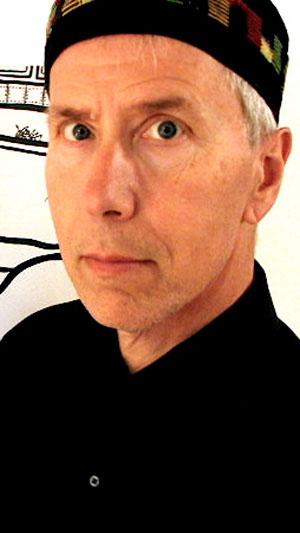Foil
I ride the long arc of the freeway
through West L.A., the low, bland shops
and houses flexing in the heat like mats
of algae, distant hills and towers
wrapped in petrochemical gauze. I’m
thinking about love the way fishermen
on the pier must think about their tropical homes,
the shacks and shanties filled with children,
the carbide-tainted waters teeming with fish
every color of metal. Has the pollution
of their dreams been slow or quick?
I catch the glare off a taller building,
that hospital, and am nearly blinded
by the memory of a girl’s copper hair.
Published in Solo Novo
Scavenger Hunt
The instructor was a deep-dish rhubarb pie.
(Well, maybe not deep, but certainly rhubarb.)
Even the thinnest slice left your tongue tingling.
Without (in most cases) a word of apology
we each placed a poem in the middle of the table
while the other students passed their hands above the page.
One poem turned into a donor organ, a liver,
ready for transplant. Another morphed into
someone's great grandmother's hat pin.
There was a sonnet that became a bucket
of dead roses, and quite a few headstones,
small and eaten by weather. There was
a gleaming petrochemical sunset and a car
in a cornfield resting on concrete blocks.
There was a girl with a wall-eye and a young son,
a couple of kids playing a twilight game of catch,
a couple in bed discretely covered by a blood-soaked
sheet, and an atom bomb looming over a tiny city
like a cobra, not to mention a dowsing stick,
a catalog of catalogs, a dimpled peasant doll
holding a cell phone, a plastic "tortoise shell"
compact with a cracked mirror, a forged
Gutenberg Bible, and a couple of strands
of viral DNA from the 1918 flu pandemic.
It was exhausting work, and eventually the whole
class feel asleep like townsfolk in a fairy tale.
That's when the pie changed into an old woman
made of copper tubing and sheet rock.
(Of course, I was asleep at the time, but my dream
seemed as real as anything that had come before.)
Slowly, so as not to wake anyone, she clanked
around the room and touched the students.
One became a meatloaf, one a hooded vulture,
one a priest. But she ran out of magic, don't ask
me why. When the meatloaf started scratching
his beard, the vulture noticed and ate him up.
The priest ducked under the table and kissed
the girls' kneecaps. But when everybody woke
(not everybody, we were a few bodies short),
there was nothing particularly strange or unusual
(we were used to the unusual, it was what we lived for),
just people with hangovers, staring at a vulture,
its beak and wattles slick with rhubarb.
Published in Spoon River Poetry Review
Festival of Mars
How can we not love them, our great men,
who were once our children, boys who climbed
the hazel nut and pear and pelted our downcast
heads with early fruit? Early they learned
cruelty, it was so much a part of the world,
like a tree taking in the soil’s bitterness
and making it flower. We could only marvel
as they scattered like monkeys at our shouts
and curses, as if they could outrun
even themselves. And now they stand
before us, all medals, oaths and stiff uniforms,
heedless of the frail skin that fills with every breath.
Let us praise them with voices raised as one,
and curse ourselves for what they have become.
Forthcoming in Water-Stone Review
|
 |
